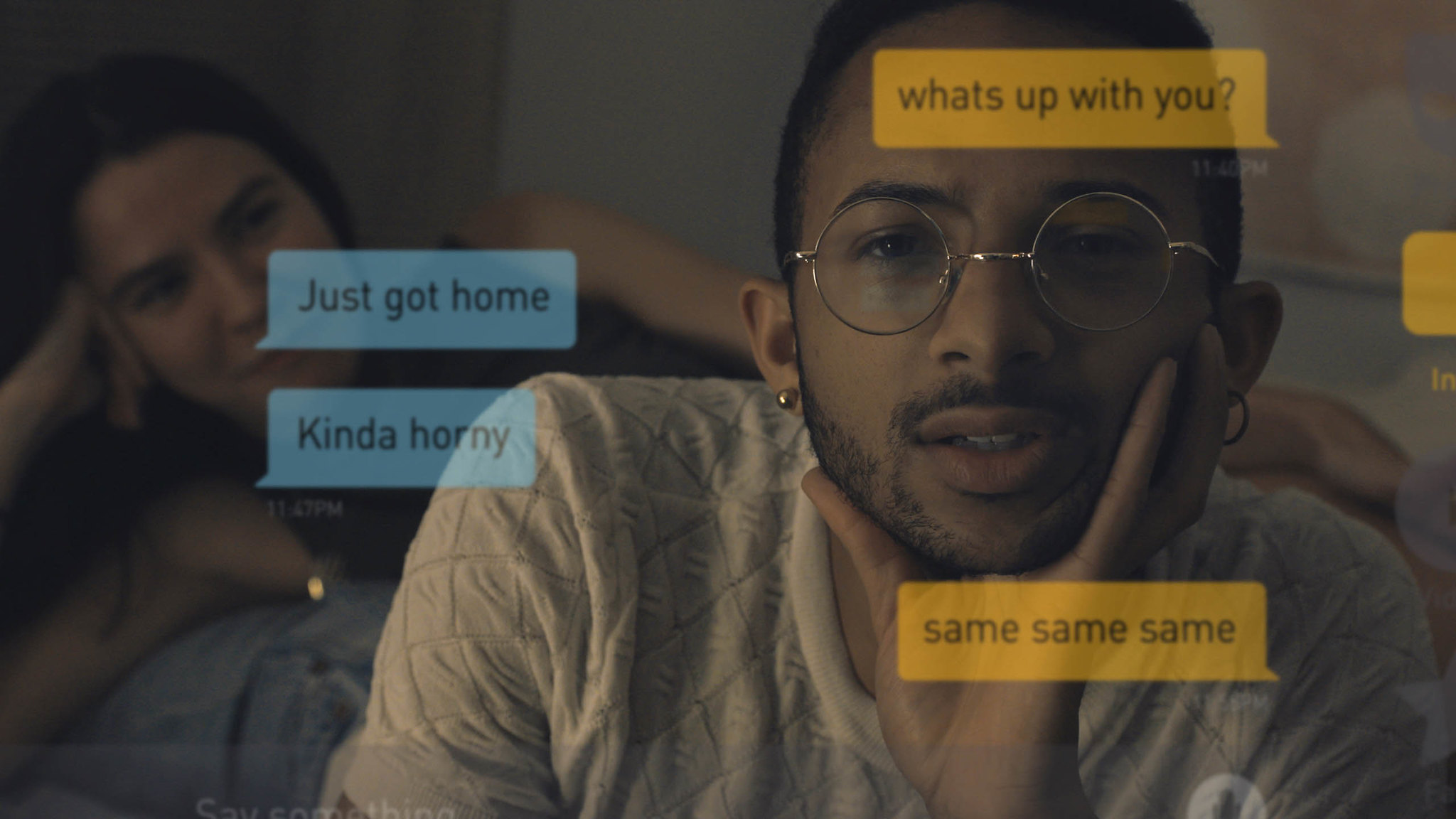The NEXT slate at Sundance is intended to celebrate digital filmmaking that pushes the boundaries of cinema to strange new places. For three films in this section, that means exploring love in the time of cellular. Mobile phones have forever changed the ways of wooing worldwide. More and more, couples are meeting through dating apps. Terms like “sexting,” “ghosting,” and “left on read” have entered the lover’s lexicon, for better and for brutal. What does that mean for romance? To explore this question, NEXT filmmakers dove into online dating, plotted an action-packed first date, and resurrected Romeo and Juliet.
The mystery of how to find your match one that a barrage of dating apps promises to solve. Whatever you’re looking for—be it a casual hook-up, a soulmate, or a sugar daddy—there’s an app for that. But how does it work? In “Searchers,” documentarian and single man Pacho Velez asked a wide array of New Yorkers, who use everything from OKCupid to Grindr to Seeking Arrangement. There are grousing old men, who lament that apps are the only way to meet anyone in these pandemic times. A meek fortysomething ponders what he wants in a relationship as a nosey co-worker intrudes on the interview. An elegant octogenarian who laments that fifty-something men aren’t interested in her, while a pair of 19-year-old women frankly discuss the going rate for being a sugar baby. To Velez, they reveal their interests, turnoffs, and relationship goals, mostly while engaging in an inventive interview setup.
He’s created a system that mimics the POV of a user’s camera phone as they swipe through dating apps. We see the user’s face, eyes narrowed as they peruse pics or ponder flirtatious DMs. They react in real-time to possibilities presented, swiping right or left. Velez reflects portions of dating profiles translucently on the screen, carefully cropping out faces and names that would identify a person. It gives his audience an uneasy front row seat to the snap judgment nature of online dating. Pressed to explain choices, some subjects get flustered while others appear to preform with shade or diplomacy. It seems they have all the power in this relationship. However, this peculiar position also allows the doc’s viewers to sit in judgment of the parade of faces that appear before them. It’s a clever move on Velez’s part, but one that never advances much beyond this table’s turn.
Occasionally, he’ll take us out of these cramped screen interviews, unfurling B-roll of New York City in the times of COVID. Sidewalks still bustle, though they are not stuffed with tourist. Cabs whizz by parks, where people wearing masks sit alone or coupled up. And every single person is looking down at their phone. Of course, they may not be interacting with dating apps, but the Kulshov Effect of it all suggests everyone is looking for love online. Velez is. He even throws himself in the hot seat, alongside his mother, who really wishes her 40-year-old son would settle down already. Yet despite these shake-ups, there’s no sense of progress in the film. Nothing happens.
For all this talk of pick-up lines, sex, and bewildering break-ups, Velez never follows any of his subjects on a date or into a relationship, no matter how brief. The closest we get to an arc is a disturbing look at a spreadsheet, wherein one young man has been charting details on all his dates to map a strategy to relationship success. In relentless close-ups, Velez presents a window into the lives of these New York lovers, who struggle to keep nagging mothers and unwelcomed speculations out of frame. It’s initially interesting. But as the doc fails to develop beyond introductions, it is ultimately shallow and deeply unsatisfying.

Thankfully, “R#J” manages what “Searchers” doesn’t attempt: it gives us an arc of a romance born and fostered online. Co-written and directed by Carey Williams, this contemporary spin on Romeo and Juliet re-imagines Shakespeare’s tale of star-crossed lovers, told found-footage-style through social media. Romeo (Camaron Engels) falls for Juliet (Francesca Noel) at first sight, specifically peeping her Instagram page, where she posts soulful art under #J. They sweet-talk through text messages, gifs, memes, and emojis. Their passionate explanations to friends are expressed through Facetime or Facebook Messenger. And, of course, the violent clashes between the Montagues and Capulets are captured in livestreams, on which random Veronians can comment with hearts or virtual thumb-biting.
This dramatic rebranding turns Romeo’s first crush, Rosaline, into an Instagram hottie, whose spicy feed inspires eggplant emojis. Juliet’s betrothed Paris becomes a face-tattooed Spotify rapper, the kind recently mocked on “Saturday Night Live” as comically clueless. However, the central pair feel ambiguous amid so much social media spectacle and spoofing. With an open face and dreamy eye, Engels plays Romeo as a soft boy, who will melt a girl’s heart with her sweetness, but whose love feels worrisomely facile. Noel proves his perfect match, playing Juliet as one-note: hopelessly romantic. Which is weird considering the film fumbles the actual spark of their romance.
If you’re wondering how Shakespearean text is translated into text messages, it is not. When the characters are speaking to each other, they stick more or less to the original poetry, though flourishes like curse words and modern slang do intrude. When it comes to texting, the young lovers speak like any Gen Z kid today might. The difference in these styles is never addressed and is continually jarring. Yet, most galling is how much of the play is cut because it doesn’t fit snugly in this social media framing. Carelessly chucked is much of Romeo and Juliet’s private conversation from their first night. In its place is an MOS montage of them taking selfies in secret. This isn’t enough to submerge us in a sensation of intense infatuation much less ride-or-die love. Perhaps Williams hopes the constant barrage of graphics will distract us enough not to care.
Barreling toward a finale that includes live-streamed suicides, the wheels come off this concept. Major plot points are dropped off screen, plot holes are left gaping wide, and an added—and overwrought—backstory does little but bog the film’s logic down. The young cast, filled with enthusiastic Black and brown actors, brings a lot of energy to this ambitious adaptation, and they shouldn’t be faulted for how emotionally hollow it turned out. That’s on Williams, who pushed this gimmick to places that are bold, but also cheaply shocking, and infuriatingly unearned.

Two strikes and now, “First Date” an action comedy that follows in the footsteps of movies like “Date Night,” “Game Night,” and “The Lovebirds,” and comes out being something uniquely its own. Written and directed by Manuel Crosby and Darren Knapp, the film follows a first date that teens Mike (Tyson Brown) and Kelsey (Shelby Duclos) will never forget. It begins when the shy boy bumbles into promising to pick the cool girl up for a Friday night out. There’s just one problem: he doesn’t have a car. In a frenzy to not f*ck this up, Mike buys a battered ’65 Chrysler from a shady character. So, begins a comedy of errors that will collide into car chases, crooked cops, dangerous drug dealers, and the world’s most violent book club. (They’re reading Of Mice and Men, and emotions run hot!)
Smartly scripted, “First Date” throws Mike headfirst into a slew of scenarios that could be escaped, if he could just call for help. But this flustered hero repeatedly loses his phone, forcing him to think quick and move even quicker. An explosive opening with savagely dark humor hints at the life-or-death stakes of a misstep, long before Mike’s even realized he’s on a bad path. Then, Crosby and Knapp offer an onslaught of colorful characters, who are mostly varying degrees of criminal. In this eccentric ensemble, “First Night” feels like a child of the Coen Bros’ crime comedies. (More “Raising Arizona,” less “Fargo.”) Amid sequences of kidnapping, torture, and grisly gunfire, there’s a sparkling and strange thread of humor that invites us to cackle even as the cute couple flees and flails.
However, this duo of writer/directors hasn’t yet mastered a Coen-level skill for balancing tone. The movie swings wildly from broad comedy to gruesome drama and back again, risking giving the audience emotional whiplash. There’s also some crunchy coverage when it comes to more ambitious fight scenes, making the seams of a low-budget show. But the film has a crackerjack cast that never shies away from whatever this script throws at them, makes even the messier moments fun. Nicole Berry as the steely Sergeant Davis is a surprise standout.
Overall, this wild-ass comedy is a jolting thrill ride, packed with barbed jokes, hilarious characters, and threaded with a sweet and simple romance that pulls us through the wonkier bits. Simply put, “First Date” is a diamond in the rough, but a diamond nonetheless.












